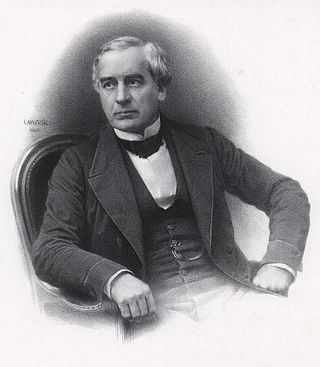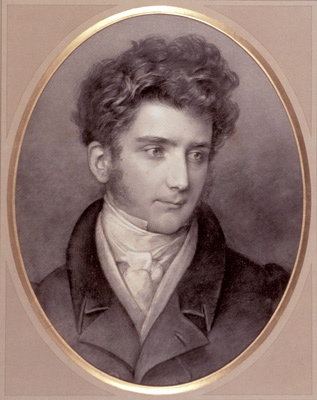Related Research Articles

The Conservatoire de Paris, also known as the Paris Conservatory, is a college of music and dance founded in 1795. Officially known as the Conservatoire National Supérieur de Musique et de Danse de Paris (CNSMDP), it is situated in the avenue Jean Jaurès in the 19th arrondissement of Paris, France. The Conservatoire offers instruction in music and dance, drawing on the traditions of the 'French School'.

Jean Antoine Letronne was a French archaeologist.

Jules Barthélemy-Saint-Hilaire was a French philosopher, journalist, statesman, and possible illegitimate son of Napoleon I of France.
Andalusī nūbah, also transliterated nūba, nūbā, or nouba, or in its classical Arabic form, nawba, nawbah, or nōbah, is a music genre found in the North African Maghrib states of Morocco, Algeria, Tunisia, and Libya but, as the name indicates, it has its origins in Andalusi music. The name replaced the older use of sawt and originated from the musician waiting behind a curtain to be told it was his turn or nawbah by the sattar or curtain man.

Jean Francisque-Étienne Martinon was a French conductor and composer.
The Patrologia Orientalis is an attempt to create a comprehensive collection of the writings by eastern Church Fathers in Syriac, Armenian, Arabic, Coptic, Ge'ez, Georgian, and Slavonic, published with a Latin, English, Italian or mostly French translation. It is designed to complement the comprehensive, influential, and monumental Latin and Greek patrologies published in the 19th century. It began in 1897 as the Patrologia Syriaca, was discontinued in its original form and replaced by the Patrologia Orientalis. The collection began with those liturgical texts that touch on hagiography. Since then critical editions of the Bible, theological works, homilies and letters have been published.

Gustave Séligmann d'Eichthal was a French writer, publicist, and Hellenist.

Charles Saint-Prot is a French geopolitician and writer. He is a historian specializing in international relations and geopolitics, in particular, questions of the Middle East and the Islamic world. Saint-Prot is the director of the Observatoire d'études géopolitiques in Paris, a research center on the international relations, and is the director, with Zeina el Tibi, of the publication Études géopolitiques

Amel Brahim-Djelloul is an Algerian soprano opera singer and concert recitalist.

Henri Dumont was a baroque composer of the French school, born in the Southern Netherlands.
The Congrès du Caire was a large international symposium and music festival that was convened by King Fuad I in Cairo, Egypt, from March 14 to April 3, 1932. The idea had been suggested to Fuad by the French ethnomusicologist Baron Rodolphe d'Erlanger, and the congress was the first large-scale forum to present, discuss, document and record the many musical traditions of the Arab world from North Africa and the Middle East.

Michel-Paul Guy de Chabanon was a violinist, composer, music theorist, and connoisseur of French literature. He was elected to the Académie des inscriptions et belles-lettres (1760) and the Académie française (1779).

Dorsaf Hamdani is a Tunisian singer, musicologist and the JMC Director
Amédée Henri Gustave Noël Gastoué was a French musicologist and composer.

Danièle Pistone is a French musicologist, emeritus professor at the University Paris Sorbonne 4.

Jacques Viret is a contemporary French musicologist of Swiss origin.
Daniel Caux was a French musicologist, essayist, journalist, music critic, radio producer and organizer of musical events.

Sonia Wieder-Atherton is a Franco-American classical cellist.
Christian Poché was a French ethnomusicologist, music critic, radio producer who specialised in Middle Eastern and African music.
References
- ↑ Arlette Millard, Félicien David et l'aventure saint-simonienne en Orient, Paris, les Presses franciliennes, 2005, p93 ISBN 2-9520091-6-3